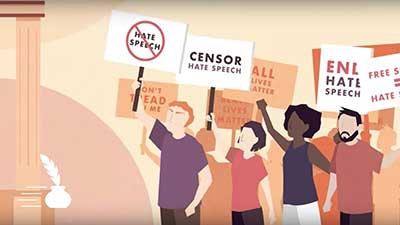Date: 27/10/2022
Relevance: GS-2: Structure, organization and functioning of the Executive and the Judiciary.
Key Phrases: Unending Flow Of Hate Speeches, Inflammatory Speeches, Genocidal Tenor, Controversial Religious Figures, Allegedly Minority-Friendly Constitution, Communal Harmony, Reasonable Restriction To Free Speech, Public Tranquility.
Why in News?
- The Supreme Court of India has directed the police for proactive action in dealing with the “unending flow of hate speeches” without waiting for a formal complaint.
Key Highlights:
- There is a growing “climate of hate” due to studied inaction by the authorities in most instances or complicity in allowing provocative speeches in purported religious gatherings by majoritarian elements despite the law containing provisions to deal with the phenomenon.
- Thus, the intervention of the SC has become necessary in the light of some controversial religious leaders getting away lightly after making unacceptable comments, some of them having a genocidal inclination.
- The Court has underscored the constitutional values of secularism and fraternity among all religions and social groups.
Definition of Hate Speech:
- There is no specific legal definition of hate speech. Provisions in law criminalise speeches, writings, actions, signs and representations that stir violence and spread disharmony between communities and groups and these are understood to refer to ‘hate speech’.
- As per the Law Commission of India, “Hate speech generally is an incitement to hatred primarily against a group of persons defined in terms of race, ethnicity, gender, sexual orientation, religious beliefs.
- In general, hate speech is considered a limitation on free speech that seeks to prevent or bar speech that exposes a person or a group or section of society to hate, violence, ridicule or indignity.
How is it Treated in Indian law?
- Sections 153A and 505 of the Indian Penal Code are generally taken to be the main penal provisions that deal with inflammatory speeches and expressions that seek to punish ‘hate speech’.
- Under Section 153A, ‘promotion of enmity between different groups on grounds of religion, race, place of birth, residence, language, etc., and doing acts prejudicial to maintenance of harmony’, is an offence punishable with three years’ imprisonment.
- It attracts a five-year term if committed in a place of worship, or an assembly engaged in religious worship or religious ceremonies.
- Section 505 of IPC makes it an offence to making “statements conducing to public mischief”.
- The statement, publication, report, or rumour that is penalised under Section 505(1) should be one that promotes mutiny by the armed forces, or causes such fear or alarm that people are induced to commit an offence against the state or public tranquility; or is intended to incite or incites any class or community to commit an offence against another class or community. This attracts a jail term of up to three years.
- Under 505(2), it is an offence to make statements creating or promoting enmity, hatred or ill-will between classes.
What is The Need of the Hour?
- A clear distinction needs to be made between freedom of expression and speech that tends to incite hatred against a public group or section of society.
- In cases relating to lynching and ‘khap panchayats’, the Court laid down guidelines on preventive, remedial, and punitive measures.
- While these are to be followed without exceptions, there is also a need for considering new criminal and penal provisions to combat hate speech.
- At a time when communally motivated gatherings are increasing in their frequency and vociferous in their inflammatory speeches against minorities, one would expect the police to be more sensitive to the situation and prevent hate speeches.
Conclusion:
- Administrative bias on the one hand and the spread of social prejudice on the other cannot be allowed to vitiate the national mood.
- Towards that end, the Court must do everything possible to nudge authorities to enforce the law against the propagation of hate.
- Taking a cue from the best international standards, it is important that specific and durable legislative provisions that combat hate speech, especially that which is propagated online and through social media, are enacted by amending the IPC and the Information Technology Act.
Source: The Hindu
Mains Question:
Q. What do you understand by hate speech? Why a proactive judicial intervention is needed against it? What needs to be done in order to curb the menace of hate speech? (250 words)






















